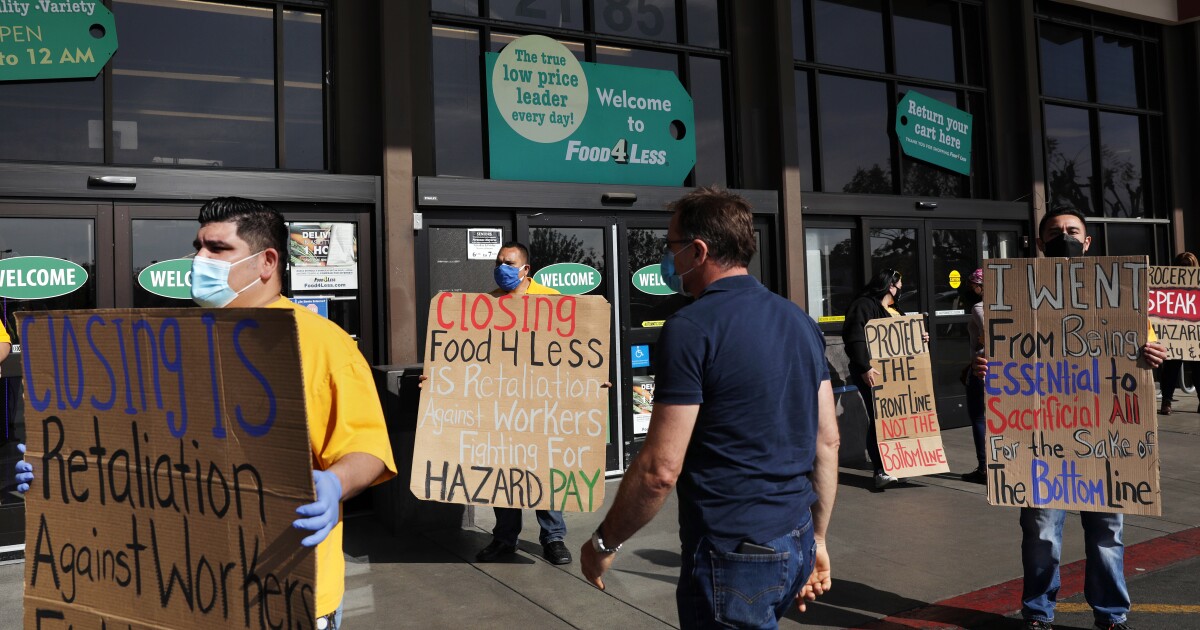Supermarket chain owner Kroger said he will close three stores in Los Angeles in response to new rules that require a $ 5 an hour increase in pay for industry workers during the pandemic, the latest round of closings he announced since the orders “hero pay” came about earlier this year.
Two Ralphs, one on West Pico Boulevard and one on West Slauson Avenue, as well as a Food 4 Less on West Sunset Boulevard, are scheduled to close on May 15, Kroger said in a statement on Wednesday. The company called the three stores “underperforming” and said the new salary increases ordered by the city of Los Angeles accelerated the decision to close them.
Kroger’s announcement comes as companies continue to argue, some in court, that the extra payment is too expensive to support and that the law unfairly highlights grocery owners when there are other companies employing frontline workers. The LA City Council voted 14 to 1 on February 24 to demand that large supermarkets and drugstores raise their workers’ wages by $ 5 an hour over the next four months.
Kroger said that wage increases for workers will add $ 20 million in operating costs during that period, making it “financially unsustainable” to keep underperforming stores in operation.
“Unfortunately, the Los Angeles City Council disregarded its own Economic Impact Report because it did not consider that supermarkets – even in a pandemic – operate with minimal profit margins in a very competitive scenario,” said the company.
An analysis released by the city a few days before the vote noted that the food sector is a low-profit sector and warned that companies could respond to the decree by closing stores, firing employees or increasing food prices. Experts say supermarkets should generally be able to absorb temporary increases in payment, although stores that are already experiencing difficulties may be more adversely affected.
Denise Francis Woods, who ran for City Council to represent her South LA district last year, said that closing the store in Slauson would cost residents their jobs and deprive the area of a necessary grocery store.
“It would be a total disaster for us if that Ralphs left,” she said. “We are considered a desert of food.”
Stuart Waldman, president of Valley Industry and Commerce Assn., Said that “these exclusive and hasty provisions are simply bad policies that will have lasting negative effects on our city”. His statement also thanked the frontline workers.
Long Beach became one of the first cities in California to pass hazardous pay rules, passing a decree stating an additional $ 4 an hour for grocery workers in late January. The reaction was quick, with California Grocers Assn. filing a lawsuit against the ordinance in the Federal Court.
Other jurisdictions that have approved similar proposals, including San Jose, San Francisco and Montebello, have also seen resistance from commercial groups.
Last month, Kroger announced the imminent closure of Ralphs and Food 4 Less in Long Beach, blaming the new salary increases. Kroger also announced plans to close two stores in Seattle after the city approved a hazard payment order; the two quality food centers scheduled to close were already underperforming, the company said.
A UC San Francisco study on death rates among workers during the pandemic reported hazardousness surcharge legislation. The study found that among the frontline workforce, food and agriculture workers faced the greatest increase in deaths. Latin food and agriculture workers were disproportionately affected, experiencing a 59% increase in mortality.
Times staff writers David Zahniser and Dakota Smith contributed to this report.
